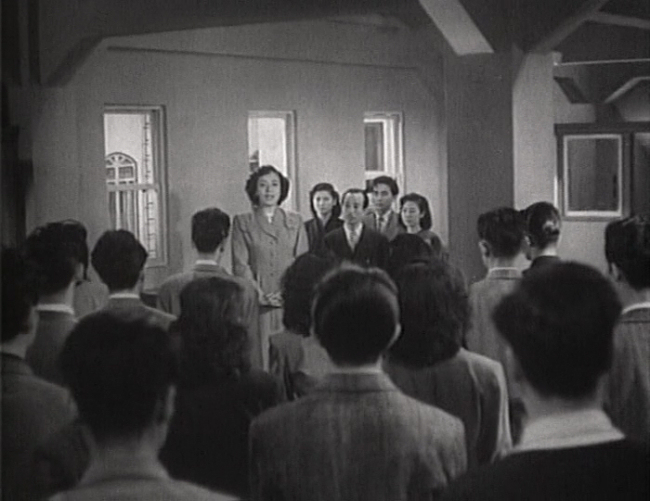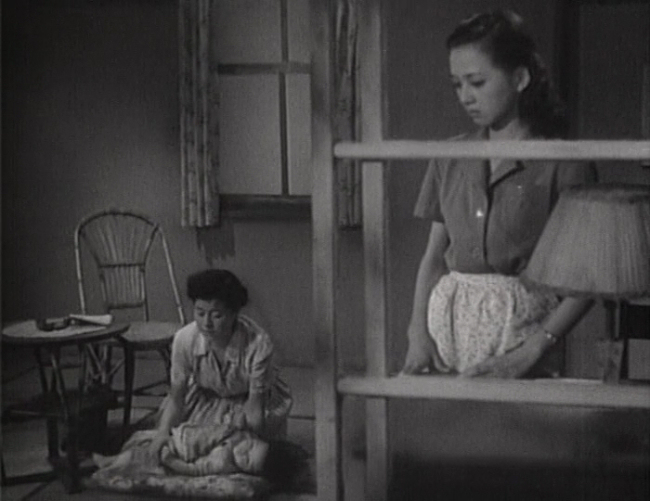
If in Sense and Sensibility Elinor became the ruthless head of a cosmetics company, and Margaret was older than Marianne, you'd come somewhat close to Miko Naruse's 1950 film Battle of Roses (薔薇合戦). It's the kind of movie Naruse's best known for, a film with female protagonists where everyone's caught in a painful, tightening web of financial anxieties and family obligations. Featuring an exceptionally pretty cast who deliver decent performances, the film is somewhat more conservative than Naruse's later, more feminist films and is somewhat cold in its rapid fire plot--though somewhat exhilarating for it, too.

The Elinor, Masago, played by the talented Kuniko Miyake, is a fascinatingly subversive character to come out of any country in 1950. The movie nicely drops you immediately into some complex goings-on, trusting you to catch up quickly on the fact that Masago's dying husband has embezzled 750,000 yen from his cosmetics company, Lilly, and Masago, along with her two younger sisters Hinako (Setsuko Wakayama) and Chisuzu (Yoko Katsuragi), are bequeathed a massive debt. So Masago goes to the head of Lilly's rival company, Nigera, and asks for help. Of course the guy wants her to sleep with him, which she does, but surprisingly he also wants to put her in charge of Nigera. He's confident she'll turn the company into a massive success and she does.

She quickly adopts the role of patriarch of her family, arranging a marriage for Hinako and even recruiting a boy toy, a handsome and young new company auditor. In one scene, he petulantly describes himself as just her "toy," echoing an earlier scene where Chisuzu's lover, Ejima, says the same thing to Chisuzu but for a different reason.

Chisuzu, the opposite of Masago in many ways--and the Marianne of the movie to continue the comparison to Sense and Sensibility--is cute as a button, is probably around twenty but looks fourteen. In contrast to Masago's cynical navigation of the entrenched mechanics of the business world, Chisuzu is an idealist spurred by romantic western influences--in one scene shown admiring a poster of Errol Flynn as Don Juan.

She doesn't see anything wrong with having sex with Ejima even though they're not married. When he starts to shake her down for 10,000 yen, even though, as she observes, they'd agreed to be independent of each other, he gives her the line about being just her toy. It's easy to see he's trying to manipulate her but naive little Chisuzu trusts him. His duplicity is confirmed when his wife, played by Noriko Sengoku in a brief role, shows up not so much to confront Chisuzu about sleeping with her husband but rather to get another 10,000 yen out of the sister of Nigera's CEO.

Fascinatingly, after all this, Chisuzu still tells her friend she doesn't regret sleeping with Ejima and the internal morality of the film doesn't punish her for it, an extraordinarily progressive moment in a film from 1950.

Hinako is the middle sister and sort of represents the philosophical middle ground between her older sister's cynicism and her younger sister's idealism. Well, it's more accurate to say that Hinako's too timid to take much of any stance, subservient to the point where her life is threatened in one scene. It's somewhat typical of Naruse to show a variety of options that all wind up with the same dead ends, usually because of selfish men. A man decides to blackmail Masago, a man abuses Chisuzu's trust, and Hinako's husband takes her for granted too. There are nice guys in Naruse films, in this case Sonoike (Koji Tsuruta), the head of a small movie advertising company responsible for producing the Errol Flynn poster Chisuzu admires. As Naruse's directorial career progressed through the 50s and 60s, there continued to be nice guys in his films but they became gradually less effectual as Naruse's view of how women are treated by society became increasingly pessimistic--and realistic.

No comments:
Post a Comment